Published: 12 March 2016
Last updated: 4 March 2024
IRBID PROVINCE, JORDAN -- Negotiations for a solution to the Israel-Palestine conflict may have stalled at the political level, but efforts continue on the ground to shore up the foundations for peace.
One of those efforts has taken the unique form of an initiative where Israeli, Palestinian and Jordanian tour guides learn about one of the region's most important shared water resources, the Jordan River. The Jordan, important for all those that reside along its banks - Israelis, Jordanians and Palestinians - is also significant from a religious perspective for Christians, Jews and Muslims.
The project is spearheaded by EcoPeace Middle East, a non-profit peace and conservation organisation that highlights how Israel, Jordan and the Palestinian Authority share one environment - even if their politics differ.
This initiative, which focuses specifically on the Jordan River's religious importance as a way to bridge gaps, comes on the heels of a previous EcoPeace cross-border tourism project where Israeli, Palestinian and Jordanian tour operators worked together developing tours, hikes and cycling trips for travellers who want to experience the geographic and cultural region despite the current national divisions. Funded by the U.S. development agency USAID, the project succeeded in creating 4 cross-border tours. These include, for example, a 10-day cycling tour, where cyclists ride from the Galilee in Israel into Jordan to visit biblical sites before crossing back over the Jordan River to the Palestinian West Bank. The ride finishes in Jerusalem’s Old City, which is shared by Jews, Christians and Muslims.
The Jewish Independent attended a three-day EcoPeace Middle East training course in Irbid province, Jordan, from Feb. 23-25, along with thirty tour guides from Israel, the Palestinian Territories, and Jordan. The course involved visiting historical sites in the Jordan Valley that are sacred to Muslims, Christians and Jews.
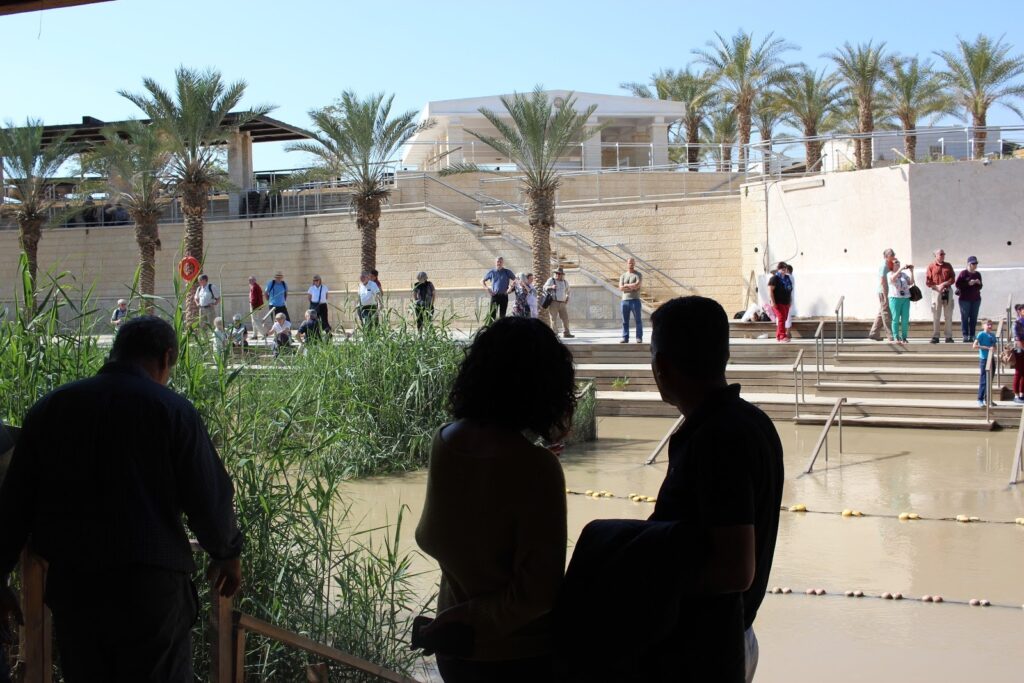 An Israeli-Arab tour guide and a Jordanian tour guide stand at the Bethany Beyond The Jordan baptism site in Jordan, looking across the Jordan River to the West Bank. (The Jewish Independent/Hunter Stuart)
An Israeli-Arab tour guide and a Jordanian tour guide stand at the Bethany Beyond The Jordan baptism site in Jordan, looking across the Jordan River to the West Bank. (The Jewish Independent/Hunter Stuart)
The idea is, if the guides learn about the Jordan Valley’s shared heritage and ecology, they’ll be better equipped to pass on that knowledge to the hundreds of tourists from around the world whom they guide each year.
“Think how many more people we can reach with our message this way,” said Mira Edelstein, EcoPeace’s Jordan River Project coordinator.
The urgency of finding common ground in this region is clear. The latest manifestation of the conflict is the wave of violence in Israel that began in early October, with more than two dozen Israelis killed in attacks since then, and over 150 Palestinians - some slain while committing attacks, others killed by Israeli forces while protesting or throwing stones at soldiers in the West Bank and Gaza.
The ongoing conflict is the backdrop for the EcoPeace training course in rural northwestern Jordan. Housed together in simple cabins, the thirty guides are separated by gender, but not by nationality or religion. After sleeping in a cabin with half a dozen of his Israeli, Jordanian and Palestinian peers, Aviv Herzlich, 28, one of the Israeli guides, remarks that a “utopian symphony of snoring” sounded through the night.
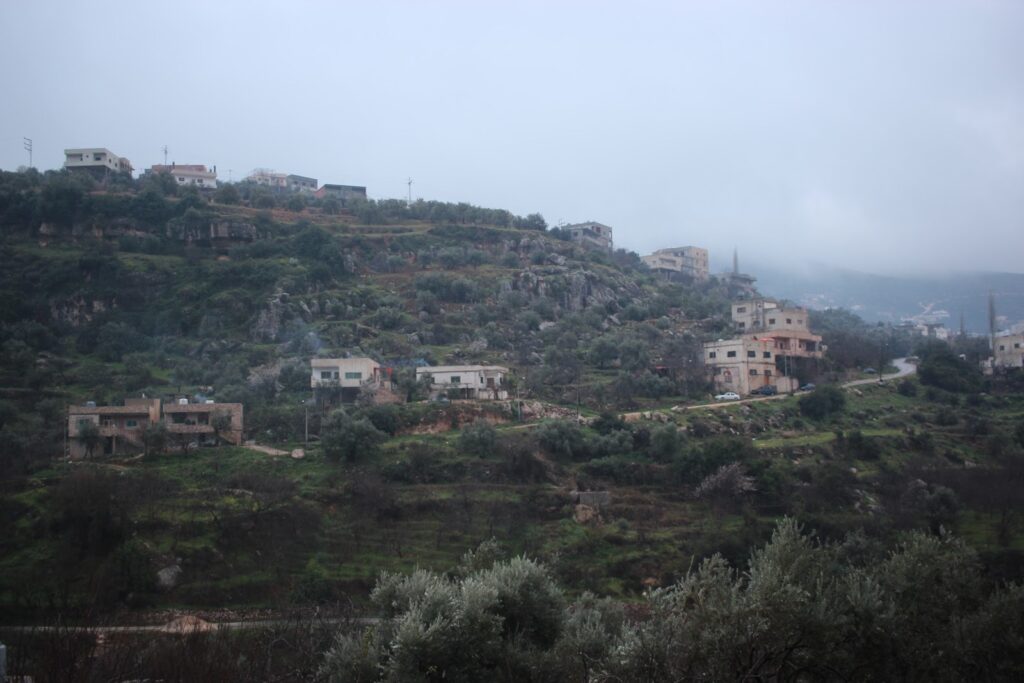 A village in Ajlun province in northern Jordan. (The Jewish Independent/Hunter Stuart)
A village in Ajlun province in northern Jordan. (The Jewish Independent/Hunter Stuart)
By day, EcoPeace staffers take the guides to historical sites in the Jordan Valley, including Pella, where some of the first followers of Jesus fled before the Romans sacked Jerusalem in 70 CE, and Mount Nebo, where Moses saw the Promised Land after leading the Israelites out of Egypt.
The area is not affluent, but there is a rugged beauty to the landscape: the hills made green by winter rains and cloaked in fog look almost Scottish - if it were not for all the mosques.
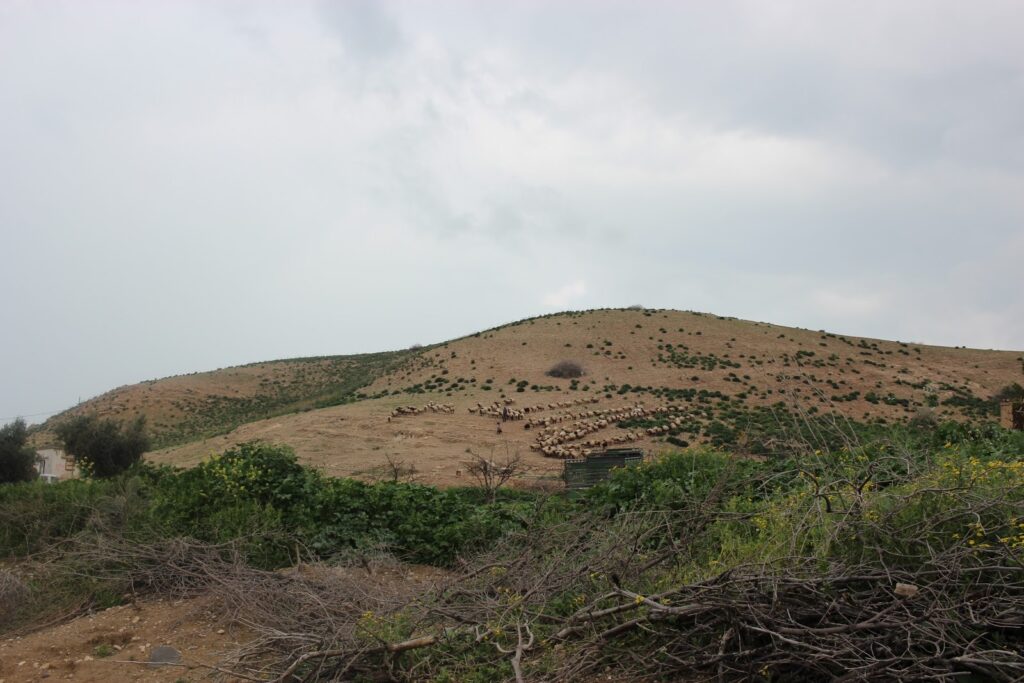 A flock of sheep on a hill in Jordan’s Irbid province, near the ecological park where the tour guides stayed during the three-day training. (The Jewish Independent/Hunter Stuart)
A flock of sheep on a hill in Jordan’s Irbid province, near the ecological park where the tour guides stayed during the three-day training. (The Jewish Independent/Hunter Stuart)
The three-day trip is particularly valuable for the Israeli guides. The Jordanians are mostly playing host, using their knowledge of the region to give informative talks over the bus’s intercom. And many of the Palestinians say they had been to Jordan, either for business or to visit family.
For Israelis, though, coming to Jordan is something of a novelty. Though Israel and Jordan have been officially at peace since 1994, Jewish Israelis seldom vacation in Jordan, and for them travelling here is not without risk, particularly during a time of increased violence. Jordan’s government recently made it a requirement that any Israeli visiting the kingdom be accompanied by a Jordanian policeman at all times.
Still, things have improved from the way they once were. “Thirty years ago, you never would have thought Israelis would be coming on vacation in Jordan,” Yuval Statman, a 28-year-old freelance tour guide from Jerusalem, told The Jewish Independent.
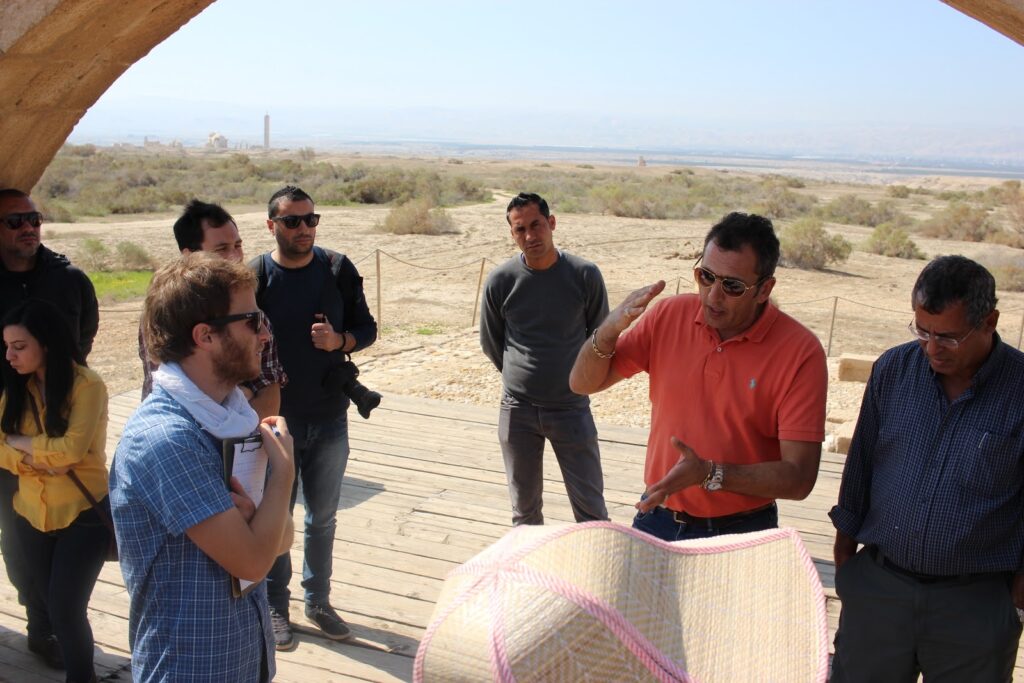 Jordanian tour guide Osama Altwal speaks to the group at Elijah Hill, a religious site in Jordan near where Jesus is said to have been baptized. (The Jewish Independent/Hunter Stuart)
Jordanian tour guide Osama Altwal speaks to the group at Elijah Hill, a religious site in Jordan near where Jesus is said to have been baptized. (The Jewish Independent/Hunter Stuart)To work legally, tour guides in Israel must undergo two years of vocational education where (among other things) they learn the religious history of Israel and the Jordan Valley. Yet that history focuses almost entirely on Christianity and Judaism, and barely touches on Islam, says Merav Stein, an Israeli tour guide, who is also employed by the Jerusalem Intercultural Centre, a non-profit organisation whose goal is to make Jerusalem a more inclusive environment for all its residents regardless of religion or ethnicity.
But if they missed out on Islamic history during their Israeli certification process, the Israeli guides are eager to make up for it now. At the Abu Ubaydah Amir Ben Al-Jarrah Shrine in Jordan’s rural Balqa province, a group of Israeli guides crowds around Kamal Al Hiyari, a freelance tour guide from the nearby city of Salt, Jordan. Al Hiyari is explaining the significance of Abu Ubaydah, one of the companions of the prophet Muhammad. His shrine here on the east bank of the Jordan River is visited by Sunni and Shia Muslims alike, Al Hiyari explains, while the Israeli guides ask questions and take notes.
Though the visits to sacred sites like this one are important, the peace building between Arabs and Jews seems to happen more between visits than during them. Whether it’s a shared smoke after dinner or a combined effort to fill in a ditch in the road with rocks so that the group’s bus can pass, it’s hard not to be moved by the sight of Arabs and Jews interacting in a natural, unconstrained manner - if only because it happens so seldom in these parts.
As the tour bus rolls through the rocky hills dotted with olive groves and herds of sheep, a particularly extroverted Jordanian guide named Osama dances in the aisles to a Jordanian pop song that blares from the bus’s speakers. The other guides clap along and laugh as he loses his balance every time the driver brakes.
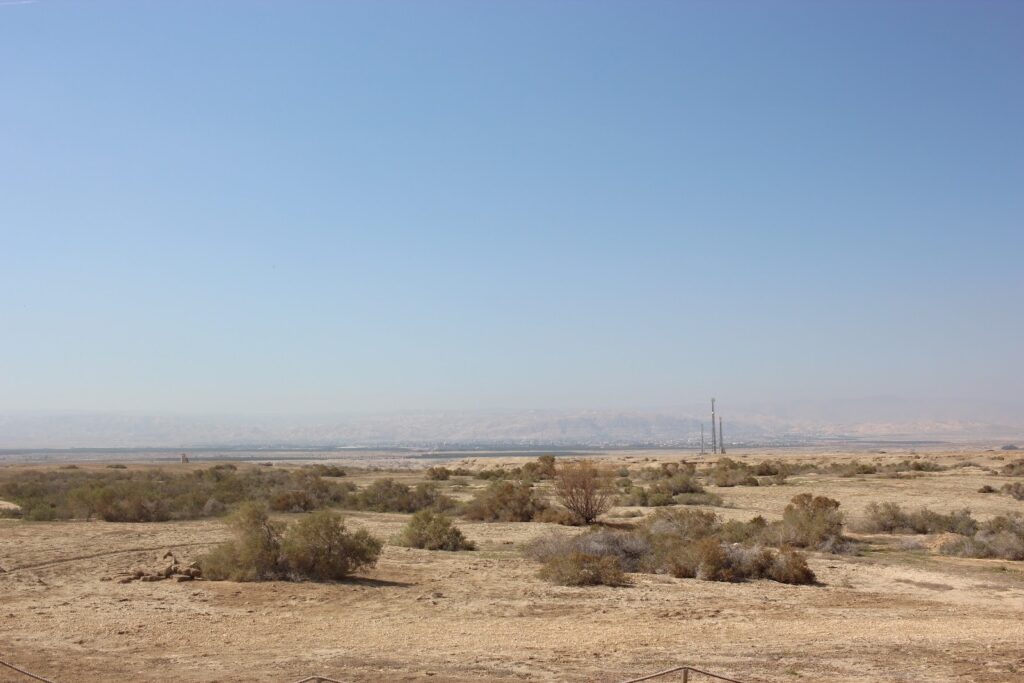 The West Bank and city of Jericho are visible from Jordan. (The Jewish Independent/Hunter Stuart)
The West Bank and city of Jericho are visible from Jordan. (The Jewish Independent/Hunter Stuart)For some, it seems completely normal that it should happen like this. Awad Yamani, a Palestinian tourism worker from Jericho, questioned why people in this region should be divided by borders when “we share the sky, the air, the sun and the moon.”
Saleh Ahmad, a Palestinian educator and receptionist at the Auja Ecocenter, a nature park and lodge near Jericho, agreed. When asked how it felt to be on a trip with Jewish Israeli tour guides, he says: “For this issue, I believe in only one thing: peace. Because nobody likes blood--only the governments, who can use the violence to get money from other countries. But not regular people.”
From time to time, politics forces its way to the surface amidst the utopian setting. “It’s crazy to sit and have lunch and a cigarette with guys from Bethlehem who want to kill me back in Israel,” remarked Statman, the freelance tour guide from Jerusalem.
Later that same day, a worker for a tourism initiative in Bethlehem that’s run by the Palestinian Authority asked The Jewish Independent not to take his picture or mention his name anywhere in this article, because the contract he’d signed with his employer forbade him from being “involved” with “any Israeli companies.”
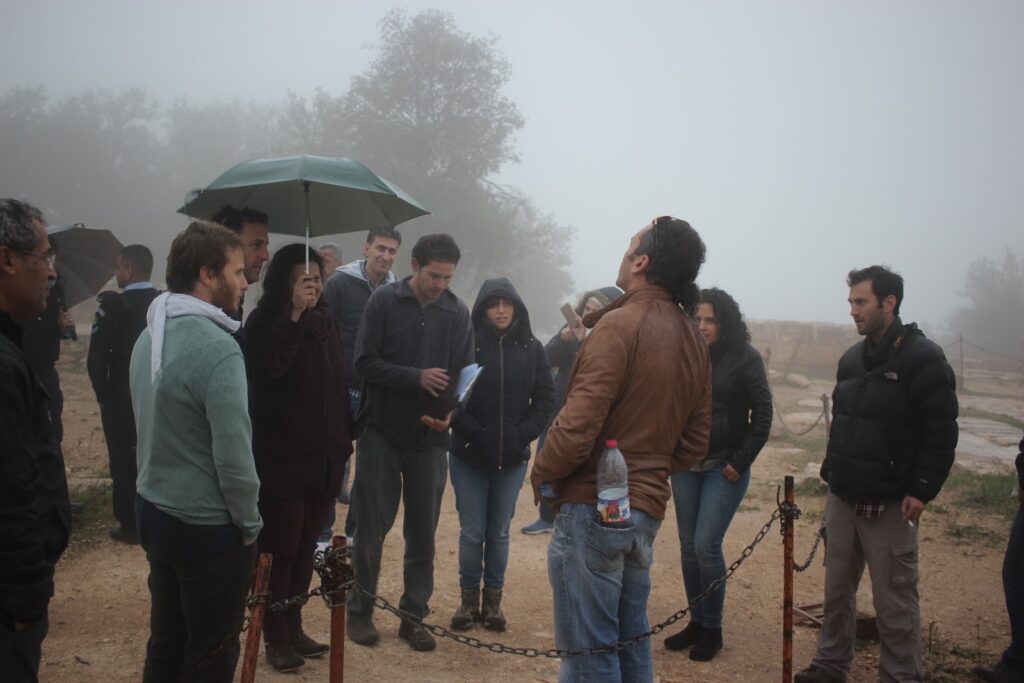 A group of Israeli, Palestinian and Jordanian tour guides at Tel Mar Elias, a sacred site in Jordan said to contain the ruins of one of the largest churches from the Byzantine era. (The Jewish Independent/Hunter Stuart)
A group of Israeli, Palestinian and Jordanian tour guides at Tel Mar Elias, a sacred site in Jordan said to contain the ruins of one of the largest churches from the Byzantine era. (The Jewish Independent/Hunter Stuart)Yet the general consensus on the tour seems to be that that Israelis, Palestinians and Jordanians are stuck together sharing this piece of land for the foreseeable future--so they’d better make the best of it.
“Israelis have more in common with Arabs than they do with Europeans or with American Jews,” says Gil Regev, a lawyer-turned-tour guide from Israel who leads private tours in Israel and Jordan. “It’s easier for an Israeli kid to learn Arabic than for him to learn French” because of the similarities between Hebrew and Arabic, he says. “And American Jews are still eating gefilte fish and matzah, but we’re already eating hummus!”
There’s an economic incentive for Israelis to have peace with the Arabs, Regev says. Business would flourish in the absence of violence, and there are few who recognise that truism better than a tour guide.
EcoPeace, which is the only organisation in the Middle East to be jointly run by Israeli, Palestinian and Jordanian directors, believes that if the Jordan River could be rehabilitated, it would lead to great benefits for the three peoples sharing its muddy banks.
Though the river was once a thundering waterway, 96 percent of its historic flow has been diverted by Israel, Syria and Jordan for domestic use, which has reduced it to a weak, polluted stream. EcoPeace released a 200-page “master plan” in June that called for 127 infrastructure projects to be completed by Israel, Jordan and the Palestinian Authority. Those “interventions”, as EcoPeace calls them, span the agriculture, tourism and sanitation industries, and would cost about US$4.5 billion over the course of 35 years.
That’s a hefty chunk of cash, but EcoPeace says much of it can be funded by the international community, and that it will create jobs and bring billions of dollars in revenue to the region. A happy byproduct of the plan, the group claims, is that it will create mutually beneficial interdependencies between Israel, the Palestinian Authority and Jordan that could be the foundation for a future peace agreement.
The need has never been greater, but it may take a while, which is why EcoPeace and others are taking the long view.
“To be honest, we don’t see peace for our generation, or for our children’s generation,” says Statman. “Maybe for our grandkids, though, it could happen.”
This The Jewish Independent article may be republished if acknowledged thus: “This article first appeared on www.thejewishindependent.com.au and is reprinted with permission."

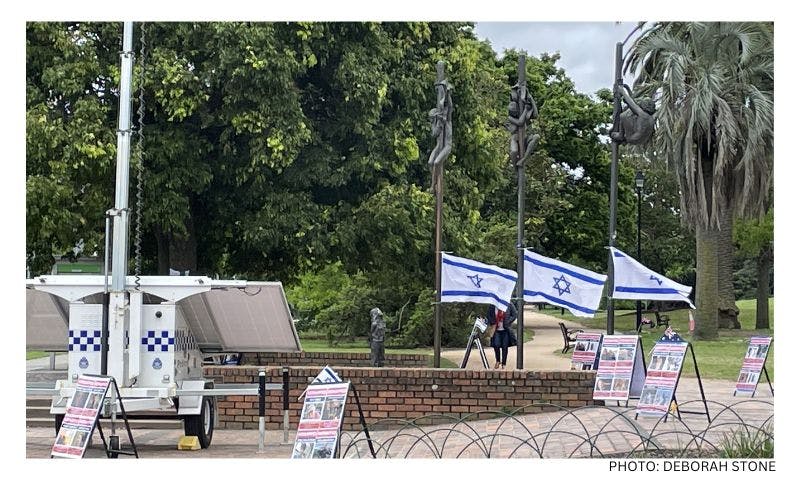
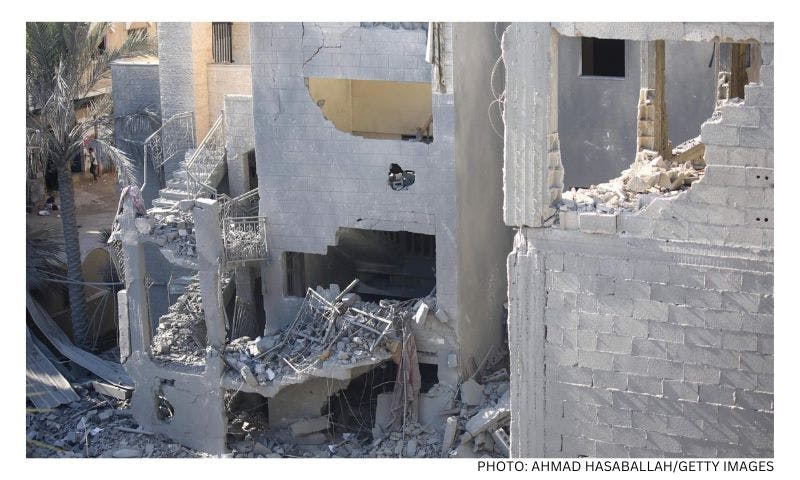
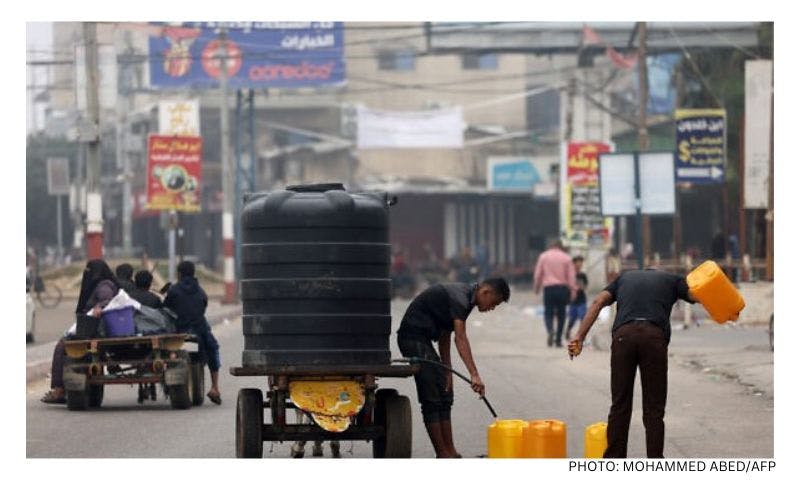
Comments
No comments on this article yet. Be the first to add your thoughts.